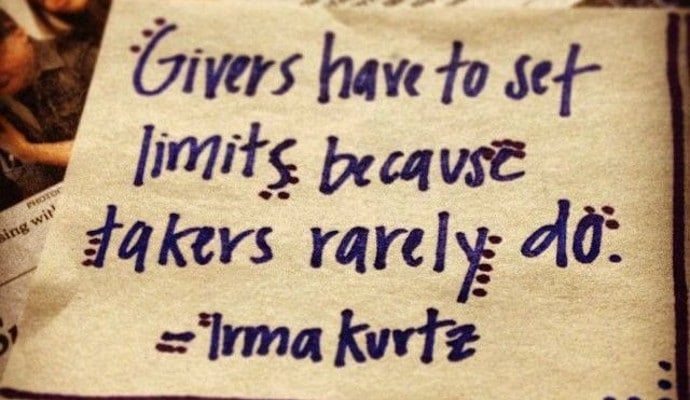
Caregivers have a hard time saying no
Caregivers care. It’s part of who you are and is an amazing quality to have. But your caring nature can also cause you to regularly take on too much. That can lead to stress, exhaustion, and poor health.
Doing too much for others can happen because it’s challenging to say no – it feels unnatural and causes guilt. But it also takes up time and energy that you could use to care for yourself.
Anne Tumlinson, founder of Daughterhood, says: “I think it’s especially difficult…to say no to a parent who wants to move in, to say no to unreasonable requests from siblings or paid caregivers, or to bow out of…obligations that are just too much on top of caregiving demands.”
Tips on saying no from an aging services expert
A key part of self-care is to set limits on what you do for others. In a recent article, Anne talks about how hard it is to say no and why boundaries (limits) are critical for caregivers. She also shares 5 tips to help you set healthy boundaries, which we’ve summarized here.
In addition to starting Daughterhood, Anne has also been an aging services expert in Washington, DC for over 20 years. Even though her website focuses on women caring for aging parents, her advice applies to anyone caring for an older adult.
5 lessons for setting healthy caregiver boundaries and improving self-care
Lesson 1. Just because someone asks you to do something doesn’t mean you should do it.
It’s almost instinctive to assume that you should do what people ask. Instead of saying yes and feeling resentful that another task has been piled on your overflowing to do list, pause and think about what you can or want to do. Even if it’s less than the original request (or simply no), respond with that instead.
Lesson 2. It’s not your job to make everyone else comfortable all the time.
You don’t have to go out of your way to solve problems that aren’t your obligation.
In Anne’s example, you’re caring for your mom and your sister lives far away. Sister feels guilty and helpless so she asks you for daily updates. This is extra time and work for you, but you do it to make her feel better.
If you stop these updates, Sister will be angry. But her anger doesn’t make her need for updates your fault. It’s not your responsibility to make her feel good about this situation.
Lesson 3. Guilt won’t kill you.
Everyone feels guilty at some point, especially caregivers. But guilt can be a mind trick that traps you in a world of “shoulds” rather than being free to do the things you want to and can do.
Lesson 4. Set boundaries with yourself.
There’s a super ambitious voice in your head that keeps pushing you to make life magazine-perfect even though you don’t have time, energy, or need for that.
Instead of obeying that voice, think about what’s most important to you and give yourself permission to choose that over unnecessary picture perfection.
Lesson 5. Your being is more important than your doing.
This is Anne’s most important tip. She says, “I’ve often felt that I need to do more in order to make up for something I feel is lacking in who I am. That if I do more that’ll help everyone get past the general concern they all must have about my worthiness.”
The critical lesson is that you are already enough. You don’t have to do anything for anyone to be worthy.
Next Step Get more of Anne’s tips on setting boundaries in her full article at Daughterhood
You might also like:
— 5 Ways Caregivers Can Care for Themselves Too
— Stop Caregiver Stress from Killing You
— Low Cost Therapy Options Help Caregivers Cope
By DailyCaring Editorial Staff
Image: Pinterest
About the Author
Anne Tumlinson
https://seniorhousingnews.com/company/anne-tumlinson-innovations/




